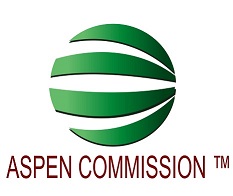ASPEN COMMISSION ™
THE CENTER FOR PHILOSOPHY POLITICS SPIRITUALITY AND SCIENCE ™
By 2022, increase information sharing with partner nations and improve partner nation connectivity to international criminal and terrorist databases in order to better identify individuals with derogatory information seeking to enter the United States. Through 2022, ensure timely dissemination of safety, security, and crisis information that allows U.S. citizens to make informed decisions for their safety while traveling or residing abroad. Through 2022, continue to ensure vigilant, accurate, and timely passport services to U.S. citizens. By September 30, 2019, we will update the DS-160 and DS-260 nonimmigrant and immigrant visa application forms and add the newly-collected fields to our data sharing feeds for interagency partners. (APG)
RENEW AMERICA’S COMPETITIVE ADVANTAGE FOR SUSTAINED ECONOMIC GROWTH AND JOB CREATION
Strategic Goal Overview American national security requires sustained economic prosperity. In an interconnected world, the Department of State and USAID must position the United States more advantageously to ensure the conditions for economic dynamism at home. As new challenges and opportunities emerge in a changing international landscape, our economic engagement with the world must be comprehensive, forward-looking, and flexible. The United States can advance its economic and security goals only through robust diplomacy, assertive trade and commercial policies, and broad-based engagement with governments and societies. Growth and economic security among U.S. allies and partners also build markets for U.S. goods and services and strengthens the ability to confront global challenges together. We must counter models promoted by other nations by offering a clear choice: The American approach is to help our partners prosper. Our economic diplomacy and development assistance are key tools in projecting this leadership to enhance security and prosperity at home. American technology is pre-eminent, our workers are the most productive in the world, and U.S. exporters thrive in global markets when given a truly fair playing field in which to compete. In close partnership with the full range of U.S. Government agencies, the Department will fight aggressively for fairer trade policies across the world and a global economy free from currency manipulation to support a strong U.S. manufacturing base and well-paying jobs, especially in cutting-edge industries. Our engagement will advance more open markets and sensible regulatory systems abroad that provide confidence without stifling innovation. We will vigorously defend U. S. intellectual property rights, uphold America’s position as the top destination for international investment, and develop new avenues for coordinating with countries and institutions to foster innovation and ensure that regulations on emerging industries do not create new barriers in areas of American strength. To further advance American leadership in international energy governance, the Department and USAID must leverage developments in the U.S. energy sector to pursue universal access to affordable and reliable energy and promote sustainable global energy markets. Our economic diplomacy and development assistance are key tools in projecting this leadership to enhance security and prosperity at home. Development, transparency, and good governance in unstable regions are essential to fight poverty, isolate extremists, and improve humanitarian conditions. The Department and USAID will promote healthy, educated, and productive populations in developing countries to drive inclusive economic growth that opens markets for U.S. investments and counters violent extremism. Investing in women’s economic empowerment has transformational effects for families and communities, and will be a key component of our approach. Confronting international environmental challenges requires robust American diplomacy and a more comprehensive deployment of U.S. environmental goods and services throughout the world. We will stand against corruption abroad, which undermines security, enables TCOs and disadvantages U.S. companies.
Promote American prosperity by advancing bilateral relationships and leveraging international institutions and agreements to open markets, secure commercial opportunities, and foster investment and innovation to contribute to U.S. job creation.
|

World Markets
-- Teddy Roosevelt, 26th President of the United States of America
Aspen Commission ™ All Rights Reserved 1996-2025
IBS INTERNATIONAL BOARD OF STANDARDS
Aspen Commission Academy of International Relations, Philosphy Politics and Innovation - International Political Foregin Relations Public Policy Council. The Aspen Commission ™ is an Association Registered in Colorado and is also a listed as an Limited Company CO USA.
CEO Commission Join Mission Ethics Home Continuing Ed Government Jobs Awards Degrees Certification newspapers Diplomacy markets Links Careers Disclaimer
Accreditation and Recognition: GAFM * www.GAFM.org * www.CertifiedProjectManager.eu * www.AAFM.org * Certified Project Manager * Certified e-Commerce Consultant * Royal Law Society * Royal Business Society * Royal Business College * Royal Fellows * Royal Economics Academy * Oxford Law School * AAFM * Certified International Project Manager * www.GMentz.com * www.CertifiedProjectManager.org * www.GeorgeMentz.com * www.AAFM.us * www.icecc.com * www.reclaimingspirituality.com *